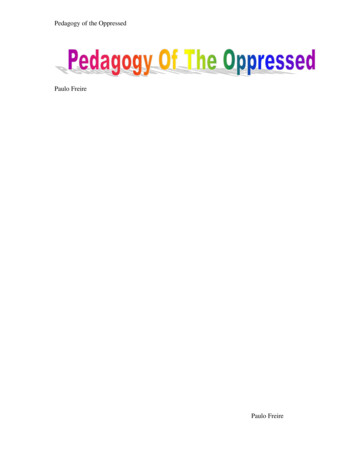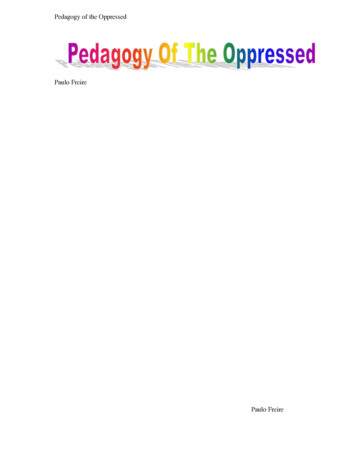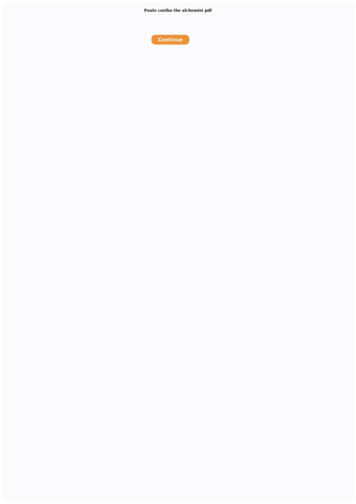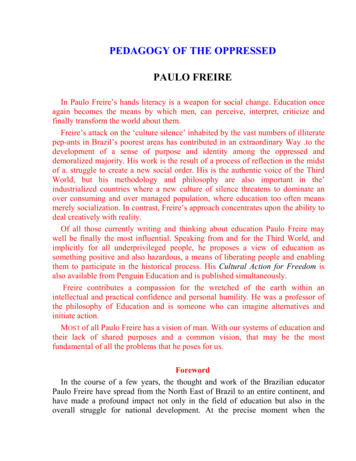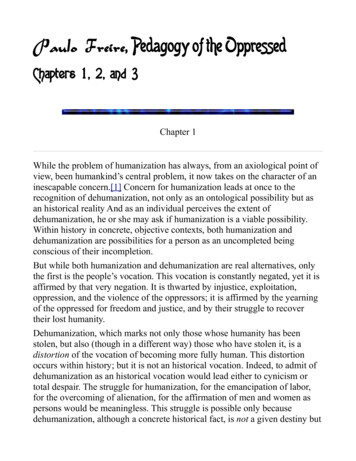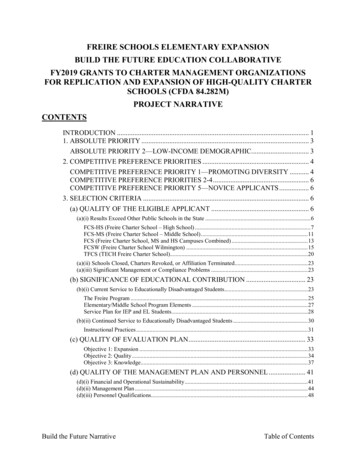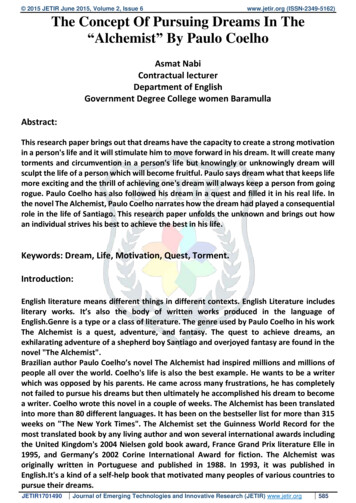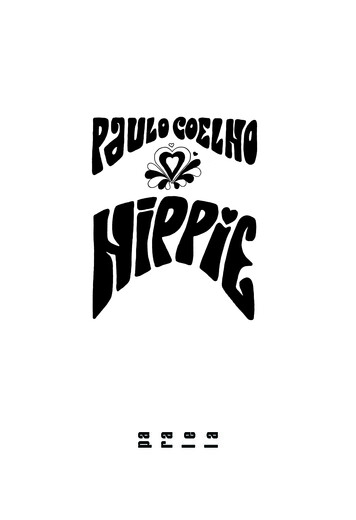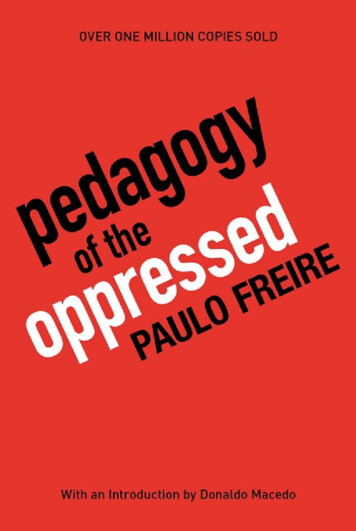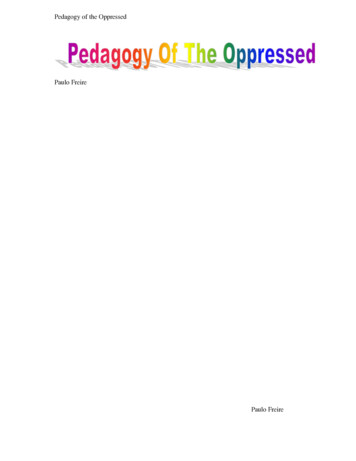
Transcription
Pedagogy of the Oppressed Paulo Freire Paulo Freire
Pedagogy of the Oppressed Paulo Freire, Pedagogy of the OppressedChapter 1While the problem of humanization has always, from an axiological point of view, beenhumankind’s central problem, it now takes on the character of an inescapable concern.[1]Concern for humanization leads at once to the recognition of dehumanization, not only as anontological possibility but as an historical reality And as an individual perceives the extent ofdehumanization, he or she may ask if humanization is a viable possibility. Within history inconcrete, objective contexts, both humanization and dehumanization are possibilities for aperson as an uncompleted being conscious of their incompletion.But while both humanization and dehumanization are real alternatives, only the first is thepeople’s vocation. This vocation is constantly negated, yet it is affirmed by that verynegation. It is thwarted by injustice, exploitation, oppression, and the violence of theoppressors; it is affirmed by the yearning of the oppressed for freedom and justice, and bytheir struggle to recover their lost humanity.Dehumanization, which marks not only those whose humanity has been stolen, but also(though in a different way) those who have stolen it, is a distortion of the vocation ofbecoming more fully human. This distortion occurs within history; but it is not an historicalvocation. Indeed, to admit of dehumanization as an historical vocation would lead either tocynicism or total despair. The struggle for humanization, for the emancipation of labor, forthe overcoming of alienation, for the affirmation of men and women as persons would bemeaningless. This struggle is possible only because dehumanization, although a concretehistorical fact, is not a given destiny but the result of an unjust order that engenders violencein the oppressors, which in turn dehumanizes the oppressed.Because it is a distortion of being more fully human, sooner or later being less human leadsthe oppressed to struggle against those who made them so. In order for this struggle to havemeaning, the oppressed must not in seeking to regain their humanity (which is a way to createit), become in turn oppressors of the oppressors, but rather restorers of the humanity of both.This, then, is the great humanistic and historical task of the oppressed: to liberate themselvesand their oppressors as well. The oppressors, who oppress, exploit, and rape by virtue of theirpower; cannot find in this power the strength to liberate either the oppressed or themselves.Only power that springs from the weakness of the oppressed will be sufficiently strong to freeboth. Any attempt to “soften” the power of the oppressor in deference to the weakness of theoppressed almost always manifests itself in the form of false generosity; indeed, the attemptnever goes beyond this. In order to have the continued opportunity to express their“generosity,” the oppressors must perpetuate injustice as well. An unjust social order is the Paulo Freire
Pedagogy of the Oppressed permanent fount of this “generosity” which is nourished by death, despair, and poverty. Thatis why the dispensers of false generosity become desperate at the slightest threat to its source.True generosity consists precisely in fighting to destroy the causes which nourish falsecharity. False charity constrains the fearful and subdued, the “rejects of life” to extend theirtrembling hands. True generosity lies in striving so that these hands — whether of individualsor entire peoples — need be extended less and less in supplication, so that more and morethey become human hands which work and, working, transform the world.This lesson and this apprenticeship must come, however, from the oppressed themselves andfrom those who are truly in solidarity with them. As individuals or as peoples, by fighting forthe restoration of their humanity they will be attempting the restoration of true generosity.Who are better prepared than the oppressed to understand the terrible significance of anoppressive society? Who suffer the effects of oppression more than the oppressed? Who canbetter understand the necessity of liberation? They will not gain this liberation by chance butthrough the praxis of their quest for it, through their recognition of the necessity to fight forit. And this fight, because of the purpose given it by the oppressed, will actually constitute anact of love opposing the lovelessness which lies at the heart of the oppressors’ violence,lovelessness even when clothed in false generosity.But almost always, during the initial stage of the struggle, the oppressed, instead of strivingfor liberation, tend themselves to become oppressors, or “sub-oppressors.” The very structureof their thought has been conditioned by the contradictions of the concrete, existentialsituation by which they were shaped. Their ideal is to be men; but for them, to be men is to beoppressors. This is their model of humanity. This phenomenon derives from the fact that theoppressed, at a certain moment of their existential experience, adopt an attitude of “adhesion”to the oppressor. Under these circumstances they cannot “consider” him sufficiently clearlyto objectivize him — to discover him “outside” themselves. This does not necessarily meanthat the oppressed are unaware that they are downtrodden. But their perception of themselvesas oppressed is impaired by their submersion in the reality of oppression. At this level, theirperception of themselves as opposites of the oppressor does not yet signify engagement in astruggle to overcome the contradiction;[2] the one pole aspires not to liberation, but toidentification with its opposite pole.In this situation the oppressed do not see the “new man as the person to be born from theresolution of this contradiction, as oppression gives way to liberation. For them, the new manor woman themselves become oppressors. Their vision of the new man or woman isindividualistic; because of their identification with the oppressor they have no consciousnessof themselves as persons or as members of an oppressed class. It is not to become free thatthey want agrarian reform, but in order to acquire land and thus become landowners — or;more precisely, bosses over other workers. It is a rare peasant who, once “promoted” tooverseer, does not become more of a tyrant towards his former comrades than the ownerhimself. This is because the context of the peasant’s situation, that is, oppression, remainsunchanged. In this example, the overseer, in order to make sure of his job, must be as tough Paulo Freire
Pedagogy of the Oppressed as the owner — and more so. Thus is illustrated our previous assertion that during the initialstage of their struggle the oppressed find in the oppressor their model of “manhood.”Even revolution, which transforms a concrete situation of oppression by establishing theprocess of liberation, must confront thus phenomenon. Many of the oppressed who directly orindirectly participate in revolution intend — conditioned by the myths of the old order — tomake it their private revolution. The shadow of their former oppressor is still cast over them.The “fear of freedom” which afflicts the oppressed,[3]a fear which may equally well leadthem to desire the role of oppressor or bind them to the role of oppressed, should beexamined. One of the basic elements of the relationship between oppressor and oppressed isprescription. Every prescription represents the imposition of one individual’s choice uponanother, transforming the consciousness of the person prescribed to into one that conformswith the prescriber’s consciousness. Thus, the behavior of the oppressed is a prescribedbehavior, following as it does the guidelines of the oppressor.The oppressed, having internalized the image of the oppressor and adopted his guidelines, arefearful of freedom. Freedom would require them to eject this image and replace it withautonomy and responsibility. Freedom is acquired by conquest, not by gift. It must bepursued constantly and responsibly. Freedom is not an ideal located outside of man; nor is itan idea which becomes myth. It is rather the indispensable condition for the quest for humancompletion.To surmount the situation of oppression, people must first critically recognize its causes, sothat through transforming action they can create a new situation, one which makes possiblethe pursuit of a fuller humanity. But the struggle to be more fully human has already begun inthe authentic struggle to transform the situation. Although the situation of oppression is adehumanized and dehumanizing totality affecting both the oppressors and those whom theyoppress, it is the latter who must, from their stifled humanity, wage for both the struggle for afuller humanity; the oppressor, who is himself dehumanized because he dehumanizes others,is unable to lead this struggle.However, the oppressed, who have adapted to the structure of domination in which they areimmersed, and have become resigned to it, are inhibited from waging the struggle forfreedom so long as they feel incapable of running the risks it requires. Moreover, theirstruggle for freedom threatens not only the oppressor, but also their own oppressed comradeswho are fearful of still greater repression. When they discover within themselves the yearningto be free, they perceive that this yearning can be transformed into reality only when the sameyearning is aroused in their comrades. But while dominated by the fear of freedom theyrefuse to appeal to others, or to listen to the appeals of others, or even to the appeals of theirown conscience. They prefer gregariousness to authentic comradeship; they prefer thesecurity of conformity with their state of unfreedom to the creative communion produced byfreedom and even the very pursuit of freedom. Paulo Freire
Pedagogy of the Oppressed The oppressed suffer from the duality which has established itself in their innermost being.They discover that without freedom they cannot exist authentically. Yet, although they desireauthentic existence, they fear it. They are at one and the same time themselves and theoppressor whose consciousness they have internalized. The conflict lies in the choicebetween being wholly themselves or being divided; between ejecting the oppressor within ornot ejecting them; between human solidarity or alienation; between following prescriptions orhaving choices; between being spectators or actors; between acting or having the illusion ofacting through the action of the oppressors; between speaking out or being silent, castrated intheir power to create and re-create, in their power to transform the world. This is the tragicdilemma of the oppressed which their education must take into account.This book will present some aspects of what the writer has termed the pedagogy of theoppressed, a pedagogy which must be forged with, not for, the oppressed (whetherindividuals or peoples) in the incessant struggle to regain their humanity. This pedagogymakes oppression and its causes objects of reflection by the oppressed, and from thatreflection will come their necessary engagement in the struggle for their liberation. And inthe struggle this pedagogy will be made and remade.The central problem is this: How can the oppressed, as divided, unauthentic beings,participate in developing the pedagogy of their liberation? Only as they discover themselvesto be “hosts” of the oppressor can they contribute to the midwifery of their liberatingpedagogy. As long as they live in the duality in which to be is to be like, and to be like is tobe like the oppressor, this contribution is impossible. The pedagogy of the oppressed is aninstrument for their critical discovery that both they and their oppressors are manifestationsof dehumanization.Liberation is thus a childbirth, and a painful one. The man or woman who emerges is a newperson, viable only as the oppressor-oppressed contradiction is superseded by thehumanization of all people. Or to put it another way the solution of this contradiction is bornin the labor which brings into the world this new being: no longer oppressor nor longeroppressed, but human in the process of achieving freedom.This solution cannot be achieved in idealistic terms. In order for the oppressed to be able towage the struggle for their liberation they must perceive the reality of oppression not as aclosed world from which there is no exit, but as a limiting situation which they can transform.This perception is a necessary but not a sufficient condition for liberation; it must become themotivating force for liberating action. Nor does the discovery by the oppressed that they existin dialectical relationship to the oppressor, as his antithesis that without them the oppressorcould not exist[4] — in itself constitute liberation. The oppressed can overcome thecontradiction in which they are caught only when this perception enlists them in the struggleto free themselves.The same is true with respect to the individual oppressor as person. Discovering himself to bean oppressor may cause considerable anguish, but it does not necessarily lead to solidaritywith the oppressed. Rationalizing his guilt through paternalistic treatment of the oppressed, Paulo Freire
Pedagogy of the Oppressed all the while holding them fast in a position of dependence, will not do. Solidarity requiresthat one enter into the situation of those with whom one is in solidarity; it is a radical posture.If what characterizes the oppressed is their subordination to the consciousness of the master,as Hegel affirms,[5] true solidarity with the oppressed means fighting at their side to transformthe objective reality which has made them these “beings for another”. The oppressor is insolidarity with the oppressed only when he stops regarding the oppressed as an abstractcategory and sees them as persons who have been unjustly dealt with, deprived of their voice,cheated in the sale of their labor — when he stops making pious, sentimental, andindividualistic gestures and risks an act of love. True solidarity is found only in the plenitudeof this act of love, in its existentiality in its praxis. To affirm that men and women are personsand as persons should be free, and yet to do nothing tangible to make this affirmation areality, is a farce.Since it is a concrete situation that the oppressor-oppressed contradiction is established, theresolution of this contradiction must be objectively verifiable. Hence, the radical requirement— both for the individual who discovers himself or herself to be an oppressor and for theoppressed — that the concrete situation which begets oppression must be transformed.To present this radical demand for the objective transformation of reality to combatsubjectivist immobility which would divert the recognition of oppression into patient waitingfor oppression to disappear by itself is not to dismiss the role of subjectivity in the struggle tochange structures. On the contrary one cannot conceive of objectivity without subjectivity.Neither can exist without the other, nor can they be dichotomized. The separation ofobjectivity from subjectivity, the denial of the latter when analyzing reality or acting upon it,is objectivism. On the other hand, the denial of objectivity in analysis or action, resulting in asubjectivism which leads to solipsistic positions, denies action itself by denying objectivereality. Neither objectivism nor subjectivism, nor yet psychologism is propounded here, butrather subjectivity and objectivity in constant dialectical relationship.To deny the importance of subjectivity in the process of transforming the world and history isnaive and simplistic. It is to admit the impossible: a world without people. This objectivisticposition is as ingenuous as that of subjectivism, which postulates people without a world.World and human beings do not exist apart from each other, they exist in constant interaction.Man does not espouse such a dichotomy; nor does any other critical, realistic thinker. WhatMarx criticized and scientifically destroyed was not subjectivity, but subjectivism andpsychologism. Just as objective social reality exists not by chance, but as the product ofhuman action, so it is not transformed by chance. If humankind produce social reality (whichin the “inversion of the praxis” turns back upon them and conditions them), then transformingthat reality is an historical task, a task for humanity.Reality which becomes oppressive results in the contradistinction of men as oppressors andoppressed The latter, whose task it is to struggle for their liberation together with those whoshow true solidarity, must acquire a critical awareness of oppression through the praxis ofthis struggle. One of the gravest obstacles to the achievement of liberation is that oppressivereality absorbs those within it and thereby acts to submerge human beings’ consiousness.[6] Paulo Freire
Pedagogy of the Oppressed Functionally, oppression is domesticating. To no longer be prey to its force, one must emergefrom it and turn upon it. This can be done only by means of the praxis: reflection and actionupon the world in order to transform it.Hay que hacer al opresion real todavia mas opresiva anadiendo a aquella la conciencia de laopresion haciendo la infamia todavia mas infamante, al pregonar1a.[7]Making “real oppression more oppressive still by adding to it the realization of oppression”corresponds to the dialectical relation between the subjective and the objective. Only in thisinterdependence is an authentic praxis possible, without which it is impossible to resolve theoppressor-oppressed contradiction. To achieve this goal, the oppressed must confront realitycritically, simultaneously objectifying and acting upon that reality. A mere perception ofreality not followed by this critical intervention will not lead to a transformation of objectivereality — precisely because it is not a true perception. This is the case of a purely subjectivistperception by someone who forsakes objective reality and creates a false substitute.A different type of false perception occurs when a change in objective reality would threatenthe individual or class interests of the perceiver. In the first instance, there is no criticalintervention in reality because that reality is fictitious; there is none in the second instancebecause intervention would contradict the class interests of the perceiver In the latter case thetendency of the perceiver is to behave “neurotically.” The fact exists; but both the fact andwhat may result from it may be prejudicial to the person. Thus it becomes necessary notprecisely to deny the fact, but to “see it differently.” This rationalization as a defensemechanism coincides in the end with subjectivism. A fact which is not denied but whosetruths are rationalized loses its objective base. It ceases to be concrete and becomes a mythcreated in defense of the class of the perceiver.Herein lies one of the reasons for the prohibitions and the difficulties (to be discussed atlength in Chapter 4) designed to dissuade the people from critical intervention in reality. Theoppressor knows full well that this intervention would not be to his interest. What is to hisinterest is for the people to continue in a state of submersion, impotent in the face ofoppressive reality. Of relevance here is Lukacs’ warning to the revolutionary party:. il doit, pour employer les mots de Marx, expliquer aux masses leur propre action nonseulement afin d’assurer la continuite des experiences revolutionnaires du proletariat, maisaussi d’activer consciemment le developpement ulterieur de ces experiences.[8]In affirming this necessity, Lukacs is unquestionably posing the problem of criticalintervention. “To explain to the masses their own action” is to clarify and illuminate thataction, both regarding its relationship to the objective acts by which it was prompted, andregarding its purposes. The more the people unveil this challenging reality which is to be theobject of their transforming action, the more critically they enter that reality. In this way theyare “consciously activating the subsequent development of their experiences.” There wouldbe no human action if there were no objective reality; no world to be the “not I” of the personand to challenge them; just as there would be no human action if humankind were not a Paulo Freire
Pedagogy of the Oppressed “project” if he or she were not able to transcend himself or herself, if one were not able toperceive reality and understand it in order to transform it.In dialectical thought, world and action are intimately interdependent. But action is humanonly when it is not merely an occupation but also a preoccupation, that is, when it is notdichotomized from reflection. Reflection, which is essential to action, is implicit in Lukacs’requirement of “explaining to the masses their own action,” just as it is implicit in thepurpose he attributes to this explanation: that of “consciously activating the subsequentdevelopment of experience.”For us, however, the requirement is seen not in terms of explaining to, but rather dialoguingwith the people about their actions. In any event, no reality transforms itself,[9]and the dutywhich Lukacs ascribes to the revolutionary party of “explaining to the masses their ownaction” coincides with our affirmation of the need for the critical intervention of the people inreality through the praxis. The pedagogy of the oppressed, which is the pedagogy of peopleengaged in the fight for their own liberation, has its roots here. And those who recognize, orbegin to recognize, themselves as oppressed must be among the developers of this pedagogy.No pedagogy which is truly liberating can remain distant from the oppressed by treating themas unfortunates and by presenting for their emulation models from among the oppressors. Theoppressed must be their own example in the struggle for their redemption.The pedagogy of the oppressed, animated by authentic, humanist (not humanitarian)generosity, presents itself as a pedagogy of humankind. Pedagogy which begins with theegoistic interests of the oppressors (an egoism cloaked in the false generosity of paternalism)and makes of the oppressed the objects of its humanitarianism, itself maintains and embodiesoppression. It is an instrument of dehumanization. This is why, as we affirmed earlier, thepedagogy of the oppressed cannot be developed or practiced by the oppressor. It would be acontradiction in terms if the oppressors not only defended but actually implemented aliberating education.But if the implementation of a liberating education requires political power and the oppressedhave none, how then is it possible to carry out the pedagogy of the oppressed prior to therevolution? This is a question of the greatest importance, the reply to which is at leasttentatively outlined in Chapter 4. One aspect of the reply is to be found in the distinctionbetween systematic education, which can only be changed by political power, andeducational projects, which should be carried out with the oppressed in the process oforganizing them.The pedagogy of the oppressed, as a humanist and libertarian pedagogy, has two distinctstages. In the first, the oppressed unveil the world of oppression and through the praxiscommit themselves to its transformation. In the second stage, in which the reality ofoppression has already been transformed, this pedagogy ceases to belong to the oppressedand becomes a pedagogy of all people in the process of permanent liberation. In both stages,it is always through action in depth that the culture of domination is culturallyconfronted.[10]In the first stage this confrontation occurs through the change in the way the Paulo Freire
Pedagogy of the Oppressed oppressed perceive the world of oppression; in the second stage, through the expulsion of themyths created and developed in the old order, which like specters haunt the new structureemerging from the revolutionary transformation.The pedagogy of the first stage must deal with the problem of the oppressed consciousnessand the oppressor consciousness, the problem of men and women who oppress and men andwomen who suffer oppression. It must take into account their behavior; their view of theworld, and their ethics. A particular problem is the duality of the oppressed: they arecontradictory, divided beings, shaped by and existing in a concrete situation of oppressionand violence.Any situation in which “A” objectively exploits “B” or hinders his and her pursuit of selfaffirmation as a responsible person is one of oppression. Such a situation in itself constitutesviolence even when sweetened by false generosity; because it interferes with the individual’sontological and historical vocation to be more fully human. With the establishment of arelationship of oppression, violence has already begun. Never in history has violence beeninitiated by the oppressed. How could they be the initiators, if they themselves are the resultof violence? How could they be the sponsors of something whose objective inaugurationcalled forth their existence as oppressed? There would be no oppressed had there been noprior situation of violence to establish their subjugation.Violence is initiated by those who oppress, who exploit, who fail to recognize others aspersons — not by those who are oppressed, exploited, and unrecognized. It is not the unlovedwho initiate disaffection, but those who cannot love because they love only themselves. It isnot the helpless, subject to terror, who initiate terror, but the violent, who with their powercreate the concrete situation which begets the “rejects of life.” It is not the tyrannized whoinitiate despotism, but the tyrants. It is not the despised who initiate hatred, but those whodespise. It is not those whose humanity is denied them who negate humankind, but those whodenied that humanity (thus negating their own as well). Force is used not by those who havebecome weak under the preponderance of the strong, but by the strong who have emasculatedthem.For the oppressors, however, it is always the oppressed (whom they obviously never call “theoppressed” but — depending on whether they are fellow countrymen or not — “thosepeople” or “the blind and envious masses” or “savages” or “natives” or “subversives”) whoare disaffected, who are “violent,” “barbaric,” “wicked,” or “ferocious” when they react tothe violence of the oppressors.Yet it is — paradoxical though it may seem — precisely in the response of the oppressed tothe violence of their oppressors that a gesture of love may be found. Consciously orunconsciously, the act of rebellion by the oppressed (an act which is always, or nearlyalways, as violent as the initial violence of the oppressors) can initiate love. Whereas theviolence of the oppressors prevents the oppressed from being fully human, the response of Paulo Freire
Pedagogy of the Oppressed the latter to this violence is grounded in the desire to pursue the right to be human. As theoppressors dehumanize others and violate their rights, they themselves also becomedehumanized. As the oppressed, fighting to be human, take away the oppressors’ power todominate and suppress, they restore to the oppressors the humanity they had lost in theexercise of oppression.It is only the oppressed who, by freeing themselves, can free their oppressors. The latter, asan oppressive class, can free neither others nor themselves. It is therefore essential that theoppressed wage the struggle to resolve the contradiction in which they are caught; and thecontradiction will be resolved by the appearance of the new man: neither oppressor noroppressed, but man in the process of liberation. If the goal of the oppressed is to become fullyhuman, they will not achieve their goal by merely reversing the terms of the contradiction, bysimply changing poles.This may seem simplistic; it is not. Resolution of the oppressor-oppressed contradictionindeed implies the disappearance of the oppressors as a dominant class. However, therestraints imposed by the former oppressed on their oppressors, so that the latter cannotreassume their former position, do not constitute oppression. An act is oppressive only whenit prevents people from being more fully human. Accordingly, these necessary restraints donot in themselves signify that yesterday’s oppressed have become today’s oppressors. Actswhich prevent the restoration of the oppressive regime cannot be compared with those whichcreate and maintain it, cannot be compared with those by which a few men and women denythe majority the right to be human.However, the moment the new regime hardens into a dominating “bureaucracy”[11] thehumanist dimension of the struggle is lost and it is no longer possible to speak of liberation.Hence our insistence that the authentic solution of the oppressor-oppressed contradiction doesnot lie in a mere reversal of position, in moving from one pole to the other. Nor does it lie inthe replacement of the former oppressors with new ones who continue to subjugate theoppressed — all in the name of their liberation.But even when the contradiction is resolved authentically by a new situation established bythe liberated laborers, the former oppressors do not feel liberated. On the contrary, theygenuinely consider themselves to be oppressed. Conditioned by the experience of oppressingothers, any situation other than their former seems to them like oppression. Formerly, theycould eat, dress, wear shoes, be educated, travel, and hear Beethoven; while millions did noteat, had no clothes or shoes, neither studied nor traveled, much less listened to Beethoven.Any restriction on this way of life, in the name of the rights of the community, appears to theformer oppressors as a profound v
dilemma of the oppressed which their education must take into account. This book will present some aspects of what the writer has termed the pedagogy of the oppressed, a pedagogy which must be forged with, not for, the oppressed (whether individuals or peoples) in the incessant struggle to regain their humanity. This pedagogy
